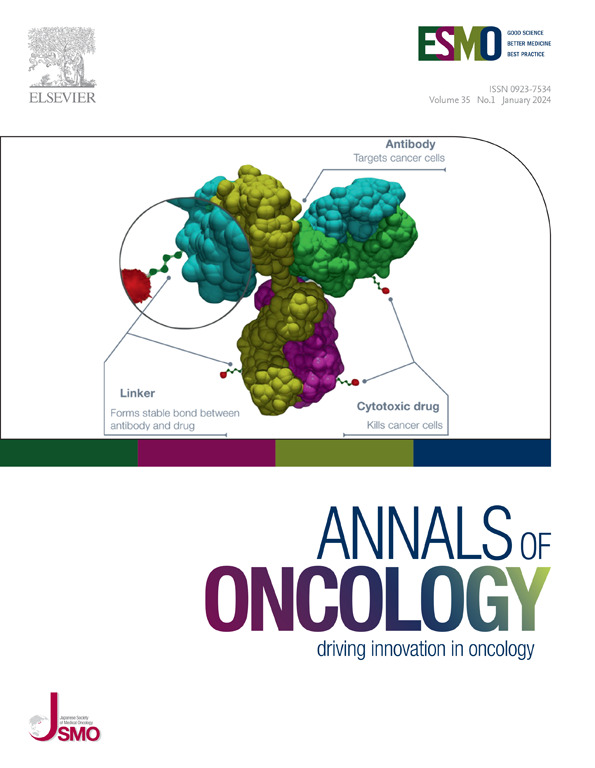Efficacy assessment in phase I clinical trials: endpoints and challenges
IF 56.7
1区 医学
Q1 ONCOLOGY
引用次数: 0
Abstract
The scope of phase I clinical trials in oncology goes beyond the conventional safety evaluation-only objectives of these trials in other specialties. Rather, most first-in-human oncology clinical trials have therapeutic intent, and efficacy signals observed in phase I trials can drive a go/no-go decision of advancing a new molecule to phase II testing. The complexity of efficacy assessment in the context of a small, heterogeneous patient population and a complex study design requires a more liberal perspective compared with later trial phases when looking into efficacy endpoints. Classically, in later-phase clinical trials, these endpoints would include the objective response rate, progression-free survival, and overall survival. However, new, evolving endpoints may be worth investigating when looking into the antitumor activity signals in phase I trials. Integration of all these endpoints into trial designs can improve the assessment of therapeutic efficacy during early drug development and guide decisions related to the further advancement of novel molecules into later phases. In this review, we discuss the advantages and pitfalls of different classic efficacy endpoints when evaluated as part of phase I trials in oncology and describe how challenges in assessing the antitumor activity of new drugs can be overcome through the incorporation of novel endpoints that have thus far proven successful in clinical trials.
I期临床试验的疗效评估:终点和挑战。
肿瘤学I期临床试验的范围超出了传统的安全性评估,这些试验的目标仅限于其他专业。相反,大多数首次人体癌症试验都有治疗目的,在I期试验中观察到的疗效信号可以推动是否将新分子推进到II期测试的决定。在小型、异质性患者群体和复杂研究设计的背景下,疗效评估的复杂性要求在观察疗效终点时,与后期试验阶段相比,需要更自由的视角。通常,在后期临床试验中,这些终点将包括客观缓解率、无进展生存期和总生存期。然而,在I期临床试验中寻找抗肿瘤活性信号时,新的、不断发展的终点可能值得研究。将所有这些终点整合到试验设计中,可以在早期药物开发期间改善治疗效果的评估,并指导有关新分子进一步推进到后期的决策。在这篇综述中,我们讨论了不同经典疗效终点在作为肿瘤I期试验的一部分进行评估时的优势和缺陷,并描述了如何通过纳入迄今为止在临床试验中证明成功的新终点来克服评估新药抗肿瘤活性的挑战。
本文章由计算机程序翻译,如有差异,请以英文原文为准。
求助全文
约1分钟内获得全文
求助全文
来源期刊

Annals of Oncology
医学-肿瘤学
CiteScore
63.90
自引率
1.00%
发文量
3712
审稿时长
2-3 weeks
期刊介绍:
Annals of Oncology, the official journal of the European Society for Medical Oncology and the Japanese Society of Medical Oncology, offers rapid and efficient peer-reviewed publications on innovative cancer treatments and translational research in oncology and precision medicine.
The journal primarily focuses on areas such as systemic anticancer therapy, with a specific emphasis on molecular targeted agents and new immune therapies. We also welcome randomized trials, including negative results, as well as top-level guidelines. Additionally, we encourage submissions in emerging fields that are crucial to personalized medicine, such as molecular pathology, bioinformatics, modern statistics, and biotechnologies. Manuscripts related to radiotherapy, surgery, and pediatrics will be considered if they demonstrate a clear interaction with any of the aforementioned fields or if they present groundbreaking findings.
Our international editorial board comprises renowned experts who are leaders in their respective fields. Through Annals of Oncology, we strive to provide the most effective communication on the dynamic and ever-evolving global oncology landscape.
 求助内容:
求助内容: 应助结果提醒方式:
应助结果提醒方式:


